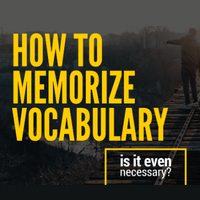How to Memorize Vocabulary - Is It Even Necessary?
In my opinion, the best way to memorize vocabulary is NOT to memorize vocabulary.
I have always found that trying to memorize vocabulary is an extremely low-efficiency activity. No matter how hard you try, some words are going to stick and some words will not stick until much, much later. I believe that the best way to acquire vocabulary is through lots of exposure and meeting vocabulary items in different contexts. The more content you consume through listening and reading, the more likely you are to encounter vocabulary items again, and every time you encounter them, you encounter them in different contexts.
This makes the whole scope of the words' meanings clearer each time. You get a better sense of which words they are used with. You really start to experience these words in live settings, and in settings that are high resonance. I always get the feeling when I'm devoting time to studying a list of vocabulary that I'm stealing time away from meaningful interaction with the language.
I could be listening, reading and/or speaking. Speaking is also important. I don't want to underestimate speaking. Perhaps I have given the impression that I only work on input. I don't. It's just that input is easier to arrange. I was at an event the other night here in Vancouver.
There was a Russian language meetup and there's no question that after sitting for two hours and speaking Russian left, right and centre, the quality of my Russian and my attentiveness to Russian went up. I especially noticed this the next time I listened and read in the language. So you do need to also speak, but meaningful speaking, meaningful listening and reading. That's all meaningful interaction with the language. It's high resonance. Hearing, seeing and using words eventually in contexts like a meetup is a better use of time than trying to memorize lists of words. Exposure is key. I don't just mean exposure to the language you're studying, but also exposure to language learning and to different languages, structures and sounds seems to make you more attentive to the language.
I lived in Japan for nine years and didn't touch Mandarin Chinese, hardly spoke it at all. Then when I came back to Mandarin Chinese, I was better. I decided to spend some time on Swedish listening to Swedish audio books. I can't remember what other language I was studying, I came back to that language – maybe it was Italian – and I understood it better. As you'll remember, I firmly believe that language learning really revolves around three issues:
Your attitude The time you give the language Your ability to notice It's not that I never study vocabulary; I very often whip through my flashcards.
At LingQ, before studying a new lesson, I'll review the saved links – the words that I have already encountered before in the process of learning, some of which I have not learned – and review them in flashcards. Often if I have 5-10 minutes to kill while waiting somewhere I'll review my flashcards, but I always have the hint (the definition saved in LingQ) on the front. So, again, it's exposure.
I'm not wracking my brain trying to remember what this term meant because I personally find that inefficient, tiring, stressful and boring. So I always say to memorize vocabulary, give yourself more exposure mostly in interesting content. If you are going to review words of course you don't have to do it my way, I'm just telling you what I do. So even when I review words, say in flashcards, it's more of an exposure activity, going through them quickly to give myself more exposure and occasionally reviewing the saved phrases on LingQ.

